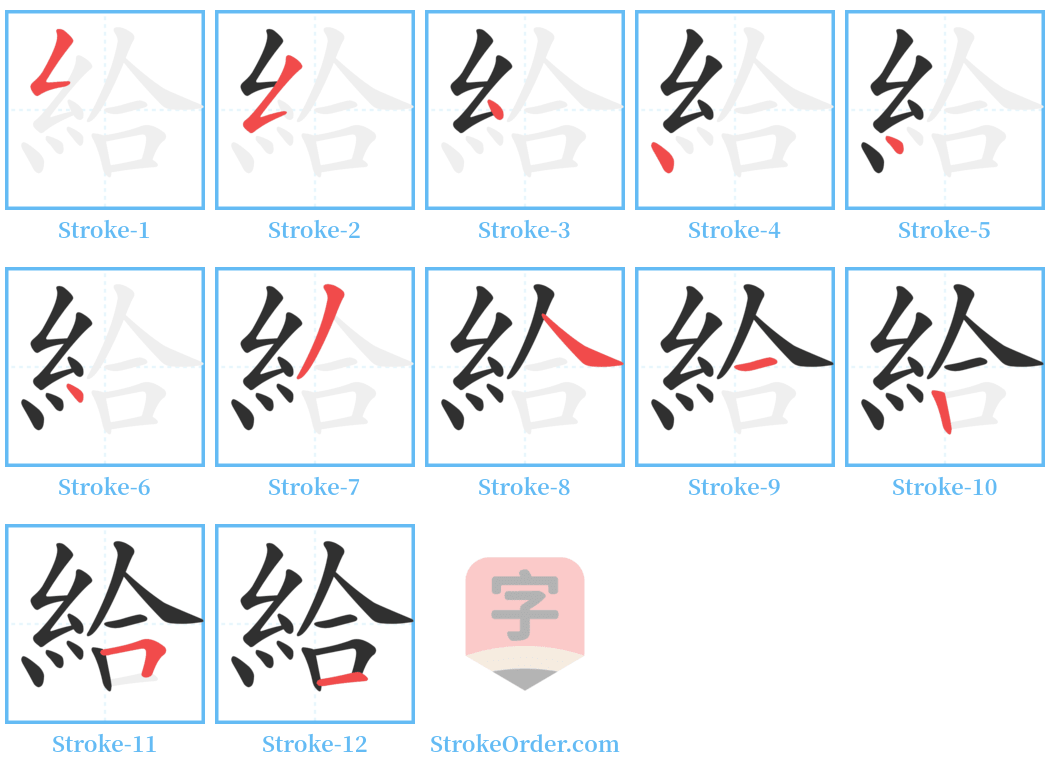給 Stroke Order
Animated Stroke Order of 給

Stroke Order Diagrams for 給

Step-by-Step Handwriting Guide for 給

Learn to Write Chinese Characters with Video Tutorials
Watch the video of writing the Chinese character "給", learn the correct stroke order (笔顺) of the character "給", and master the standard way of writing the character "給".
Free Printable Handwriting Practice with Stroke Order: 給
Printable Writing Practice Worksheet of "給" in Portrait Orientation (Tian Zi Ge)

Printable Writing Practice Worksheet of "給" in Landscape Orientation (Tian Zi Ge)

Information of 給
Pinyin
jǐ、 gěi
Radical
糹
Strokes
12 strokes
Usage
★★★
Definition
to / for / for the benefit of / to give / to allow / to do sth (for sb) / (passive particle), to supply / provide
給
1. 豐足;充裕。
Ample; well provided for; abundant.
2. 供給;供應。
Supply; provide.
3. 供事;服役。
Service; to serve.
4. 連及。
To be connected; to be related.
5. 給予;賜予。
To give; to grant.
6. 敏捷。
Quick; prompt.
7. 口齒伶俐。
Eloquence; having a fluent tongue.
8. 姓。
A surname.
9. 恭而不中禮。
Respectful but lacking propriety.
1. 豐足;充裕。《説文•糸部》:“給,相足也。”《玉篇•糸部》:“給,足也。”
Ample; well provided for; abundant. "Ji, it means sufficient." (Shuowen Jiezi)
2. 供給;供應。《玉篇•糸部》:“給,供也。”《廣韻•緝韻》:“給,供給。”
Supply; provide. "Ji, it means to supply."
3. 供事;服役。《史記•絳侯周勃世家》:“(勃)常為人吹簫給喪事。”又“給事中”的簡稱。《資治通鑑•唐代宗大曆三年》:“自給、舍以上及方鎮除拜,軍國大事皆與之議。”
Service; to serve.
4. 連及。《國語•晋語一》:“誡莫如豫,豫而後給。”
To be connected; to be related.
5. 給予;賜予。《吕氏春秋•權勳》:“若殘豎子之類,惡能給若金!”又指給養;俸祿。晋孔愉《重表讓禀賜》:“而偷安高位,横受寵給,無德而禄,殃必及之。”
To give; to grant.
6. 敏捷。《莊子•徐无鬼》:“王射之敏給。”
Quick; prompt.
7. 口齒伶俐。《論語•公冶長》:“禦人以口給,屢憎於人。”
Eloquence; having a fluent tongue.
8. 姓。《廣韻•緝韻》:“給,姓。出《姓苑》。”
A surname.
9. 恭而不中禮。《禮記•仲尼燕居》:“敬而不中禮謂之野,恭而不中禮謂之給,勇而不中禮謂之逆。”
Respectful but lacking propriety.
給 gěi
動詞
1. 使對方得到或遭受到 ([En.] give; grant; hand).
To make someone receive or suffer (something).
2. 讓;使;叫 ([En.] let).
To let; to make; to allow (someone to do something).
給 gěi
介詞
1. 表示對象、目的,相當於“爲”、“替” ([En.] for; for the benefit of).
Indicates the object or purpose, equivalent to "for" or "on behalf of".
2. 引進動作行為的主動者,或表示被動語態,相當於“被” ([En.] by).
Indicates the subject of the action or passive voice, equivalent to "by".
3. 表示方向,相當於“朝”、“對”、“向” ([En.] to).
Indicates direction, equivalent to "to" or "towards".
給 gěi
助詞
1. 用在某些動詞前面,用以加強語氣 ([En.] used before some verbs, giving stress to the tone).
Used before certain verbs to emphasize tone.
給 gěi
動詞
1. 充足的供給,以物質給予對方 ([En.] provide).
To provide sufficient material to someone.
2. 授與,交付 ([En.] confer).
To bestow; to deliver.
給 jǐ
形容詞
1. 同本義 ([En.] ample; be well provided for; abundant).
Ample; well provided for; abundant.
給 jǐ
副詞
1. 速,捷 ([En.] quickly).
Quick; prompt.
給 jǐ
動詞
1. 充足的供給,以物質給予對方 ([En.] provide).
To provide sufficient material to someone.
2. 授與,交付 ([En.] confer).
To bestow; to deliver.
給 jǐ
助詞
1. 用於主動句。
Used in active sentences.
2. 用於被動句。
Used in passive sentences.
1. 使對方得到或遭受到。《後漢書•章帝紀》:“其悉以賦貧民,給與糧種,務盡地力,勿令游手。”
To make someone receive or suffer.
2. 叫,讓。如:飯管飽,酒可是不給喝;這本書你到底給看不給看。
To let; to make.
3. 介詞。表示物件、目的,相當於“為”、“替”。
A preposition. Indicates the object or purpose, equivalent to "for".
4. 介詞。引進動作行為的主動者,或表示被動語態,相當於“被”。
A preposition. Indicates the subject of the action or passive voice, equivalent to "by".
5. 介詞。表示方向,相當於“朝”、“向”、“對”。
A preposition. Indicates direction, equivalent to "to".
給 jǐ
形容詞
1. 本义:衣食豐足;充裕。
Basic meaning: being well-fed and housed; abundant.